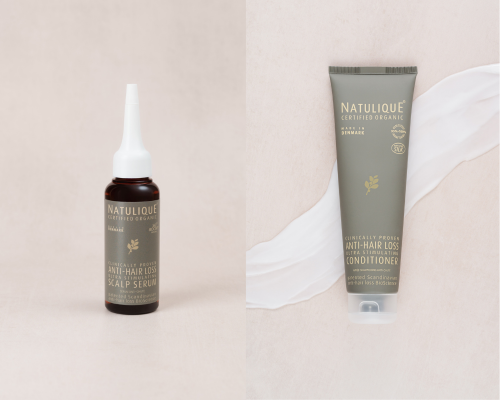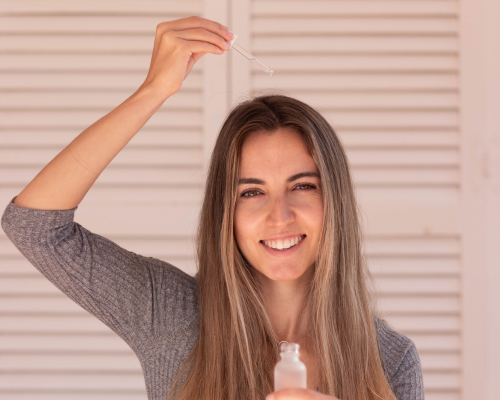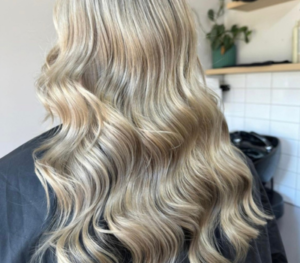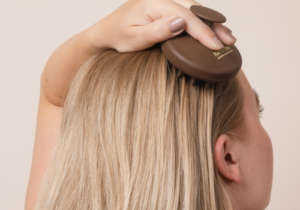Stress-related hair loss is a common problem affecting many people at different times in their lives. Understanding how and why stress can influence our hair health is essential to finding effective solutions. Let's take a closer look at this phenomenon.
Understanding stress-related hair loss
What is stress-induced hair loss?
The biological mechanisms behind hair loss
Stress-induced hair loss, often referred to as telogen effluviumHair loss occurs when hair follicles prematurely enter the resting phase of the hair cycle. Normally, up to 90 % of your hair is in the active growth phase, but stress can disrupt this cycle. This imbalance leads to increased hair loss a few months after the stressful event.
Symptoms of stress-related hair loss
Key symptoms of stress-related hair loss include sudden, even hair loss on the scalp. Hair may appear thinner and sparser, but the good news is that this is often a temporary condition. Nevertheless, persistence of such symptoms beyond six months may require medical consultation.
Common stress factors leading to hair loss
Work-related stress
Work-related stress is one of the main causes of mental and physical strain. Tight deadlines, the pressure of results, and the fear of losing your job can increase steroid levels in the body, directly impacting the health of your hair.
Emotional stress
Difficult times, such as bereavement, a break-up, or any other emotional upheaval, can affect your overall well-being. Unmanaged emotional stress can lead to chemical imbalances in the body, exacerbating hair loss.
Physical stress
It's not just mental stress; physical stresses such as accidents, surgery or even illness can cause hair loss. The body will then prioritize its healing efforts, pushing hair cycles into the background.
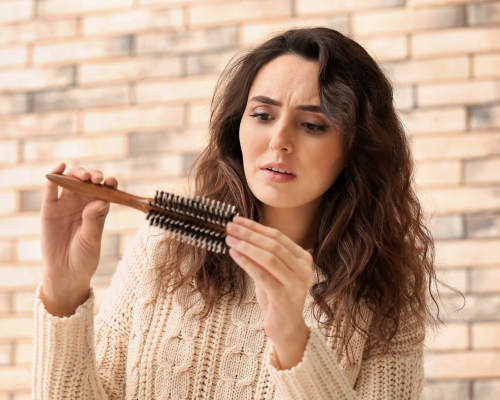
Stress management strategies to prevent hair loss
Relaxation techniques to reduce stress
Meditation
Meditation is an ancient practice that can play a crucial role in stress management. It helps to reduce excessive mental activity and restore a sense of calm and clarity. Studies show that even a few minutes a day can have positive effects on stress management, indirectly contributing to the health of your hair. Regular meditation can reduce anxiety, improve sleep and promote better hormonal balance.
Yoga
Yoga combines breathing techniques, tension postures and guided meditations to create a state of deep relaxation. It has been shown to reduce levels of cortisol, known as the stress hormone. By incorporating yoga into your routine, you can not only benefit from a suppler, stronger body, but also a more serene mind. This peace of mind can help you better manage everyday stress triggers, promoting better hair health.
Breathing exercises
Breathing exercises, such as diaphragmatic breathing or the 4-7-8 breathing technique, can be powerful tools for controlling stress. They generally consist of deep inhalations followed by slow, controlled exhalations. These practices help activate the parasympathetic nervous system, promoting a relaxing response in the body. Adopting these breathing techniques regularly can improve your resilience in the face of stress, reducing the risk of stress-related hair loss.
The importance of a balanced lifestyle
A healthy diet
A balanced diet plays a crucial role in overall health, including hair health. Consuming essential nutrients, such as B vitamins, vitamin C, zinc, and protein, can strengthen hair from the inside out. Include antioxidant-rich foods, fruits, vegetables and nuts in your diet. Not only can this improve the strength of your hair, it can also boost your overall health, contributing to better stress management.
Regular exercise
Physical activity is a natural and effective way to reduce stress. Regular exercise releases endorphins, often called "happy hormones", which can improve mood and alleviate stress. Whether it's running, swimming or cycling, find a physical activity you enjoy and make it part of your weekly routine. This will not only help maintain a healthy weight, but also promote a healthy scalp and growing hair.
Recuperative sleep
Quality sleep is essential for a healthy body and mind. Lack of sleep can exacerbate stress, contributing to hair loss. Make sure you get 7 to 9 hours of restful sleep every night. Create an environment conducive to sleep by reducing exposure to screens before bedtime, maintaining a pleasant room temperature, and adopting a soothing bedtime routine. Adequate sleep helps balance stress hormones, supports tissue regeneration and promotes better hair health.
See also: How can I avoid a root effect after coloring?
Medical and natural treatments for hair loss
Available medical treatments
Minoxidil
Minoxidil is one of the most commonly used medical treatments for hair loss. Available as a lotion or mousse, it encourages hair growth by increasing blood flow to the hair follicles. This treatment can be effective for stress-related hair loss, but requires regular use to maintain results. It is advisable to consult a healthcare professional before starting this treatment to ensure that it is suitable for your situation.
Finasteride
Finasteride is an oral medication often prescribed to treat hair loss in men. It works by inhibiting the hormone DHT, which can cause hair follicles to shrink. Although not specifically designed for stress-induced hair loss, it can be beneficial in cases where other hormonal factors contribute to the phenomenon. As with any drug treatment, it is important to discuss potential side effects with a doctor.
Natural remedies to promote hair growth
Essential oils
Essential oils, such as lavender, rosemary or peppermint oil, are renowned for their ability to stimulate hair growth. They can be massaged directly into the scalp or diluted in a carrier oil such as coconut oil. These oils help improve blood circulation to the hair follicles and possess soothing properties that can reduce the effects of stress on hair health.
Nutritional supplements
Certain supplements, such as biotin, iron and omega-3 fatty acids, are known to support hair health. Biotin, in particular, is a B vitamin that plays an essential role in keratin production. Be sure to consume these supplements under the supervision of a healthcare professional to determine appropriate doses and prevent possible drug interactions.
Lifestyle changes to support a healthy scalp
Reduced use of chemicals
Excessive use of harsh chemicals, such as hair dyes and styling products, can weaken hair. Opt for natural, gentle hair products that respect your hair's texture. This can reduce physical stress on the hair and promote growth.
Scalp massages
Regular scalp massages can stimulate blood circulation and promote healthy hair follicles. These massages can be performed using essential oils or specially formulated hair serums. As well as encouraging hair growth, massages offer a moment of relaxation that can reduce stress.
Have realistic expectations
Stress-related hair loss can take time to reverse. It's important to have realistic expectations about the results of treatments, whether medical or natural. Consistency and patience are essential, as reducing stress and promoting hair health are ongoing processes.
Practical tips to limit stress-related hair loss
Adopting the right hair care routine
Choose gentle hair care products
Using the right hair care products for your hair type is crucial to avoid stress-induced deterioration. Opt for sulfate-free shampoos, paraben-free care products and nourishing masks that restore moisture and strengthen the hair fiber.
Avoid heated styling tools
Frequent use of heated styling tools, such as straightening irons or hair dryers, can exacerbate stress-related hair loss. Reduce their use as much as possible and favor air-drying or low-temperature drying to minimize damage.
Avoid stressful situations
Learning to say no
Knowing how to set limits is essential for managing stress. Saying no to extra commitments or non-essential tasks can help you take care of your mental health, reducing stress and the impact on your hair.
Planning time for yourself
Taking time out to relax and engage in activities you enjoy is crucial to reducing stress. Whether it's reading, walking in nature or any other soothing activity, this personal space contributes to emotional balance and the regulation of capillary well-being.
Frequently Asked Questions (FAQ)
1. How long does it take to see an improvement in stress-related hair loss?
Improvements may vary from person to person, but generally you can start to see positive changes after three to six months of effective stress management and appropriate hair care.
2. Is stress-related hair loss permanent?
In most cases, stress-related hair loss is temporary. By addressing the underlying causes and adopting stress management strategies, hair regrowth is possible.
3. Can dietary supplements really help?
Yes, dietary supplements such as biotin and omega-3 fatty acids can support hair health. However, it is advisable to consult a health professional before starting any supplementation.
4. Is it safe to use essential oils to stimulate hair growth?
Essential oils can be beneficial to hair health when used correctly. Dilute them with a carrier oil and perform a skin test beforehand to avoid any allergic reaction.
5. Is stress the only factor causing hair loss?
No, other factors such as genetics, hormonal fluctuations and certain diseases can also contribute to hair loss, but stress is a notable catalyst that's crucial to control.
